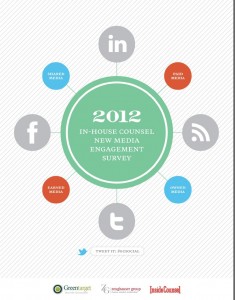Is social media distracting lawyers from the real work of developing new clients?
A healthy little discussion on the Martindale.com Connected social network this week asked the question, “Has Social Media Gotten Lawyers Out of Focus?”
Particular emphasis was placed upon evidence that while it may be more “natural” for the young professional to use social networking and social media, it’s not helping them engage face-to-face in business development settings. [Paraphrased].
Should we blame social online forums for the lack of offline people skills or inability to do the real work of developing clients? I don’t think we should rush to that conclusion, do you?
It is true that many young professionals know how to navigate the social Web quite well; they may even spend a good bit of time there to the chagrin of an outsider who perceives it to be wasted time. But, the fact is their peers are present there—those who could or would one day hire the services of a lawyer—and communication channels are changing.
Communication Channels Change
As a law firm marketing professional for over 15 years, one who continually seeks out beneficial communication channels, I have seen first hand the evolution of various technologies used for marketing communications between lawyer and client—carbon paper, teletype, fax, photo copier, answering machine, mass mail, email, color photo copiers, floppy disc brochures, cd-rom seminar materials, e-holiday cards, websites, intranet, Extranets and more.
Each of these new tools was ushered into the management and marketing of law firms with varying degrees of skepticism so it is only natural that blogs, wikis, social networks, sharing, collaboration, search engine marketing, video, postcast, webcast, and mobileApps are receiving the same sort of attention. They all require degrees of change; and it’s not over yet. (Stay tuned for the semantic web – yikes! It’s really revolutionary)
That being said, what I have not seen change is:
- the need for human voice;
- effective language skills;
- an attractive personality;
- sincerity;
- confidence;
- the need to understand the buying and selling process; and
- the ability to build trust.
These fundamentals do not change, regardless of the chosen communication channel. As I write in my soon to be released book, social.lawyers: Transforming Business Development (West Publishing):
We’re not doing any thing different, we’re just doing things differently.
While some may think that the art of human engagement that leads to business relationships is being lost in the social media shuffle, I’d argue that not a single one of us skips down the road to becoming a rainmaker. It evolves over time with trial and error, coaching, mentorship, and of course simple maturity, both professional and personal, no matter what the forum. And that’s why it’s important to include some basic business training into every lawyer’s schedule.
Tools are NOT a substitute for fundamentals
Maybe it’s time to rethink a few things. Growing up on the social Web is not inherently a bad thing, but having a macro-training scheme can help. For marketing professionals, coaches, and mentors, the key is to make sure young professionals know the tools are not a substitute for the hard work of studying the psychology of sales and honing face-to-face people skills—provide fundamental business development training.
Business basics and client development fundamentals plus tactics that include the nuances of social web placement and best practices can be a winning combination; because this new media of marketing and business communication is not going to go away.
If social media is making you lose your focus, or if you never had focus in the first place, then perhaps its time to re-boot.






As with almost every industry, social media can definitely become a distraction. To establish a presence, let alone maintain it, can take a lot of time. I’ve actually started running social media platforms for a couple of firms, and I’m surprised more lawyers aren’t doing something similar (hiring someone else to handle this, not necessarily me). Especially when you consider what most attorneys charge by the hour, and you look at that against how many hours they spend on Facebook and Twitter.